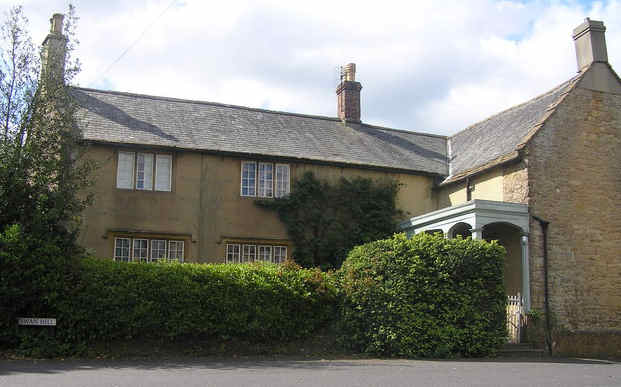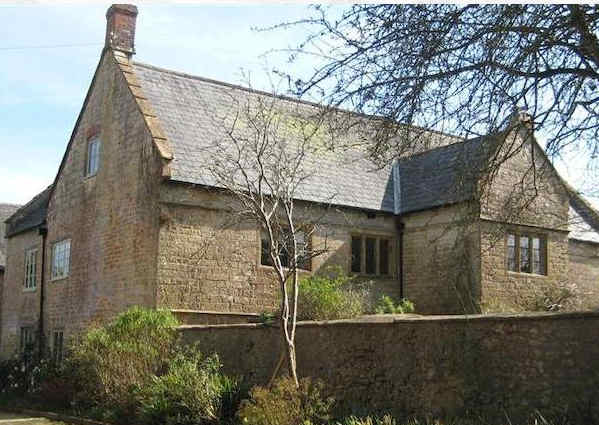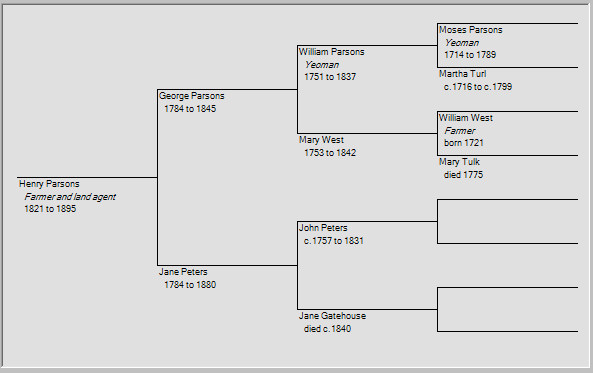 Sidney Alfred Parsons and his Ancestors
Sidney Alfred Parsons and his AncestorsHenry Parsons (1821 to 1895)
Henry Parsons was a nephew of Charles Parsons of Marston Magna, who was a great-grandfather of Sidney Parsons. He was therefore Sidney’s cousin twice removed.
Henry was born in Charlton Horethorne in Somerset in 1821 and was baptised on the 10th of August of that year. His father, George Parsons, was a son of William Parsons who had owned land in Kington Magna, Dorset, and had been an inn-keeper in Holton, near Wincanton. Henry’s mother, Jane Peters, was the sister of John Weston Peters, a very wealthy land owner. John Weston Peters had no male heirs, and when he died much of his fortune passed to his sister Jane’s sons, Henry and his brothers. Henry was his parents’ third child of that name, the previous two having died as infants.

Henry continued to live in Charlton Horethorne for some time after his father died in 1845. He farmed and acted as a land agent, selling
houses, farms and stock on behalf of his clients among whom was Lord Portman. The advertisement shown here on the
right, from the Sherborne Mercury, is an example of his work.
Henry left Charlton Horethorne and went to live in the manor house in Haselbury Plucknett which is a small village about 6 miles south west of Yeovil and not far from Crewkerne. He leased the house, and its associated farm, from Lord Portman for whom he continued to work as a steward and land agent. Two of Henry’s brothers, George Parsons and Uriah Parsons, also acted as stewards for Lord Portman.
In 1851 Henry Parsons married Elizabeth Mary Merefield Donne. The wedding held was on the 28th of January in Haselbury Plucknett. Elizabeth lived in Crewkerne where she and her brother, who were orphans, were staying with an elderly relative called Anna Maria Susanna Donne. (Elizabeth and Benjamin were descended from a younger brother of Anna’s grandfather.) The witnesses at Henry and Elizabeth’s wedding were her brother Benjamin John Merefield Donne, John Weston Peters who was a wealthy and influential friend of the Parsons family, and John’s wife Ezit Peters.
Henry and Elizabeth continued to live in Haselbury and in June 1855 he hosted the celebrations for the wedding of Lord Portman’s son Henry Berkeley Portman, who was later to become Viscount Portman. Henry Portman’s bride was Mary Selina Charlotte FitzWilliam, daughter of William Charles FitzWilliam, Viscount Milton. There was an open air party of about 800 people, including 300 of Lord Portman’s tenants, with roast beef and plum pudding followed by dancing and sporting competitions. A newspaper account of the festivities can be found at Lord Portman’s web page.
In 1856 Elizabeth’s elderly relative Anna Maria Susanna Donne died leaving her and her brother Benjamin to inherit her home, Merifield House on the north side of East Street in Crewkerne, which had previously been occupied by the lords of the manor of Hewish, and also a substantial part of the manor itself.
The picture below shows Henry and Elizabeth’s home, the manor house in Haselbury Plucknett.

Henry and Elizabeth’s children were born while they lived in Haselbury. Henry continued to farm, and his work as a
land agent and steward made him well known and respected throughout the south-west of England.
His nephew Henry Hole (a son of his brother-in-law John Hole) lived with him in Haselbury and worked as his assistant.
He became Honorary Secretary of the Haselbury Plucknett Labourer’s Association and in 1867 several of his men won prizes at their annual meeting. Henry made a speech wishing them health and happiness and said that he “hoped to see their faces in the field another year”.
After Henry’s brother-in-law John Hole died in July 1871 Henry acted as the executor of his estate.
In 1872, The Western Gazette reported that Henry Parsons went to court to recover the cost of six of his cattle who had strayed onto a railway line through a damaged fence. He won the case.
“Parsons versus the London and South Western Railway Company.
Mr. Cole, Q.C., and Mr Charles (instructed by Mr. J.T. Nicholetts, of South Petherton) appeared for
plaintiff, who claimed £111 13s. Mr. Lopes, Q.C., and Mr. Pindar represented defendants (instructed by
Mr. Crombie).
Mr. Henry Parsons, the plaintiff, is a gentleman well-known in Somerset, Dorset and Devon, being the
steward of Lord Portman’s estates in the counties named. He resides at Haselbury Plucknett, where
he occupies an extensive farm. Part of the land abuts upon the defendant’s line of rails; one of
the fields known as ‘Rough Ground.’ On december 27th, plaintiff’s men put 14 beasts
in the field, where they were fed in the morning and again in the afternoon. On the following morning
it was ascertained that part of the Company’s fence (which consisted of wooden rails) was down,
and that several of the animals had strayed upon the line. Five of the beasts were killed by a train.
Two others were injured, and one of them was afterwards killed by plaintiff’s men. The five
carcasses were removed and sold by the defendants, and the other was sold by plaintiff. The action was
to recover the value of the five beasts, and the difference between the value of the sixth beast and the
price realised for the carcass.”
In 1875 there was an outbreak of foot-and-mouth disease and controls were imposed on the movement of cattle. In May of that year the Western
Gazette reported that Henry Parsons and his man Bryant had appeared before the magistrates in Shepton Mallet
accused of moving 22 heifers, which Mr. Parsons had just bought, along the highway from Pylle, near Shepton Mallet, to Haselbury,
when the animals were known to be affected by the disease. The case was dismissed by the chairman because, he said, there was
insufficient evidence.
During Victorian times Friendly Societies had become important features of life in England. They became formalised by an act of
Parliament in 1875. Henry Parsons became chairman and treasurer of the Haselbury Plucknett Friendly Society. The
newspaper report below, from the Western Gazette on Friday the 11th of June, 1875, describes the celebrations upon the
anniversary of its founding.
“HASELBURY PLUCKNETT FRIENDLY SOCIETY. — The anniversary of this society
was celebrated on the 1st inst., and was ushered in by the firing of cannon and the merry ringing of the Church bells. The village
was gaily decorated, triumphal arches spanned the road, and many of the cottages were bedecked with evergreens. The
male and female members assembled at 10 o'clock, and the roll was called by the secretary, Mr. Johnson. The usual
procession was then formed, headed by the Yeovil Rifle Corps Band, under Bandmaster Beare. The male members were
attired in white, with blue and pink sashes. Visits were paid to the Vicarage and the residence of Henry Parsons,
Esq., after which they repaired to the Church, where an appropriate sermon was preached by the Rev. J. Hancock.
After service the members proceeded to North Perrott, and visited the residences of the Vicar, the rev. H. Hoskins,
Mr. Rendall, and Mr. Slade, where they were hearily received, and entertained with cake, wine and cider. The
processionists then returned to Hazelbury, where, in one of Mr. Parsons’ sheds, Mr. W. Bartlett had provided
an excellent dinner. After so long a walk, the repast was thoroughly enjoyed. The chair was taken by the respected
treasurer, H. Parsons, Esq., who was supported by Thomas Hoskins, Esq., W.F. Cuff, Esq., G.F. Wills, Esq., Rev. J.
Hancock, Rev. R.F. Willis, Rev. Mr. Farmer, J.H. Bostock, Esq., Messrs. C. Edmunds, W.B. Hebditch, P. Draper, A.
Symes, F.Taylor, T.F. Bartlett, A. Rendall, R.T. Bunston, R.S. Bunston, J. Bunston, D. Bogie, W. Tytherleigh, T.
Rendall, E. Slade, J. Patch, W.R. Read, C. Shewbrooks, R. Draper, &c.
After the usual loyal toasts had been duly honoured, the Chairman gave the 'Bishop and Clergy of the Diocese,' which
was suitably acknowledged. The toast of the day, 'Success to the Society,' was drunk with enthusiasm.
A hearty vote of thanks was accorded Mr. Wills, the medical officer of the club, and the Chairman, who is the
treasurer, for their services. Mr. Wills proposed 'The Health of the Secretary,' which was acknowledged by Mr.
Johnson, who read the financial statement, which showed that the balance in hand was £172 19s 5d. £4 17s sick
allowance and £7 16s 6d funeral money had been paid during the year. The number of members is 94.
After dinner the residence of Mr. Paul Draper was visited, and a dance took place on the lawn. At Mr. W.
Bartlett’s cider was distributed. As six o’clock the members returned to the field in front of Mr.
Parsons’s house, where they sat down to a capital tea provided by Mrs. Parsons. Several ladies and gentlemen
of the village waited on the guests. The remainder of the evening was spent in an enjoyable manner, the amusement
including dancing and athletic sports.”

By 1879, Henry and his family had moved to Misterton, a mile and a half south of Haselbury, where
they lived in the Manor House which Henry bought from Lord Portman.
The Manor House at Misterton is shown here. Henry lived there until he died apart from a period around 1881 when he and Elizabeth lived in Sidmouth in Devon while his nephew Henry Hole occupied the house.
The Western Gazette reported on Friday the 4th of March, 1881, that Henry and his wife had entertained the church choir at their house:
“MISTERTON, CHOIR TREAT — The choir of the Parish Church were entertained at
tea and supper at the Manor House, on Friday Evening. Numerous games were enjoyed, songs were sung, and
a very pleasant evening was spent. Hearty cheers were given for Mr. Henry Parsons and his family before the party separated.”
Henry and his wife were shareholders of the Consolidated Bank Ltd. And in April 1881 Henry was elected a director of
the West of England Insurance Company. He was also a Justice of the Peace, chairman of the Crewkerne Highways Board, chairman of the
Crewkerne Liberal Association, and a founding director of the Crewkerne United Breweries Company.
Henry managed the estates of Lord Wolverton and Earl Poulett, as well as the local estates of the Duke of Devonshire and Lord Portman. He also worked independantly as an agent for private clients, and farmed a large amount of land.
Henry became ill in October 1895 after catching a cold while attending a sale of farming stock. He was soon confined to bed and had to give up his many duties. There were newspaper reports that he was beginning to recover but, on the 28th of December, he died in his home, the Manor House, at Misterton. A few days later there was a large memorial service in Misterton which was attended by his family, colleagues and well wishers. There were many dignitaries present. A wreath was sent by Earl Poulett, the Lord Lieutenant of Somerset. Afterwards, Henry’s coffin remained in the church overnight and the following morning was taken by train to Woking, in Surrey, to be cremated, as he had wished. Cremation was very unusual at that time. The crematorium in Woking was the first in Britain. It had been built in 1878 but because of strong local opposition it only became operational in 1885 and the chapel and buildings were not constructed until 1891.
Children of Henry Parsons and Elizabeth Parsons née Donne

Henry and Elizabeth had seven children. To read more about them click on one
of the links below.
• Henry John Donne Parsons (1851 to 1906)
• Mary Jane Parsons (1853 to 1936)
• Charles Merefield Parsons (1854 to 1881)
• Kate Parsons (1855 to 1933)
• Frank Donisthorpe Parsons (1856 to 1911)
• Herbert Parsons (1859 to 1932)
• Robert Maurice Peters Parsons (1860 to 1947)
Ancestors of Henry Parsons

Parents
Father — George Parsons, a farmer from Charlton Horethorne in Somerset
Mother — Jane Peters, the daughter of a wealthy farmer and land-owner
Grandparents
Grandfather — William Parsons, a farmer and inn-keeper from Holton in Somerset
Grandmother — Mary West from Stowell in Somersey
Grandfather — John Peters, a farmer from Kington Magna and East Stour in Dorset
Grandmother — Jane Gatehouse
Great-grandparents
Great-grandfather — Moses Parsons the younger of Kington Magna in Dorset
Great-grandmother —Martha Turl
Great-grandfather — William West, a farmer who originally came from Stowell in Somerset
Great-grandmother — Mary Tulk, his wife
Return to Sidney Parsons’ Ancestors
You are free to make use of the information in these web pages in any way that you wish but please be aware that the author, Mike Parsons, is unable to accept respsonsibility for any errors or omissions.
Mike can be contacted at parsonspublic@gmail.com
The information in these web pages comes from a number of sources including: Hampshire County Records Office, Somerset Heritage Centre; Dorset County Records Office; Southampton City Archives; the General Register Office; several on-line newspaper archives; several on-line transcriptions of Parish Register Entries; and several on-line indexes of births, marriages and deaths. The research has also been guided at times by the published work of others, both on-line and in the form of printed books, and by information from personal correspondence with other researchers, for all of which thanks are given. However, all of the information in these web pages has been independently verified by the author from original sources, facimile copies, or, in the case of a few parish register entries, transcriptions published by on-line genealogy sites. The author is aware that some other researchers have in some cases drawn different conclusions and have published information which is at variance from that shown in these web pages.
Copyright © 2013 Mike Parsons. All rights reserved.